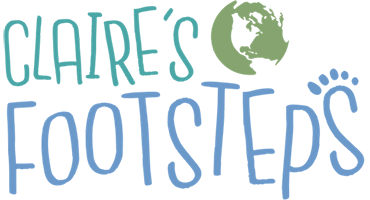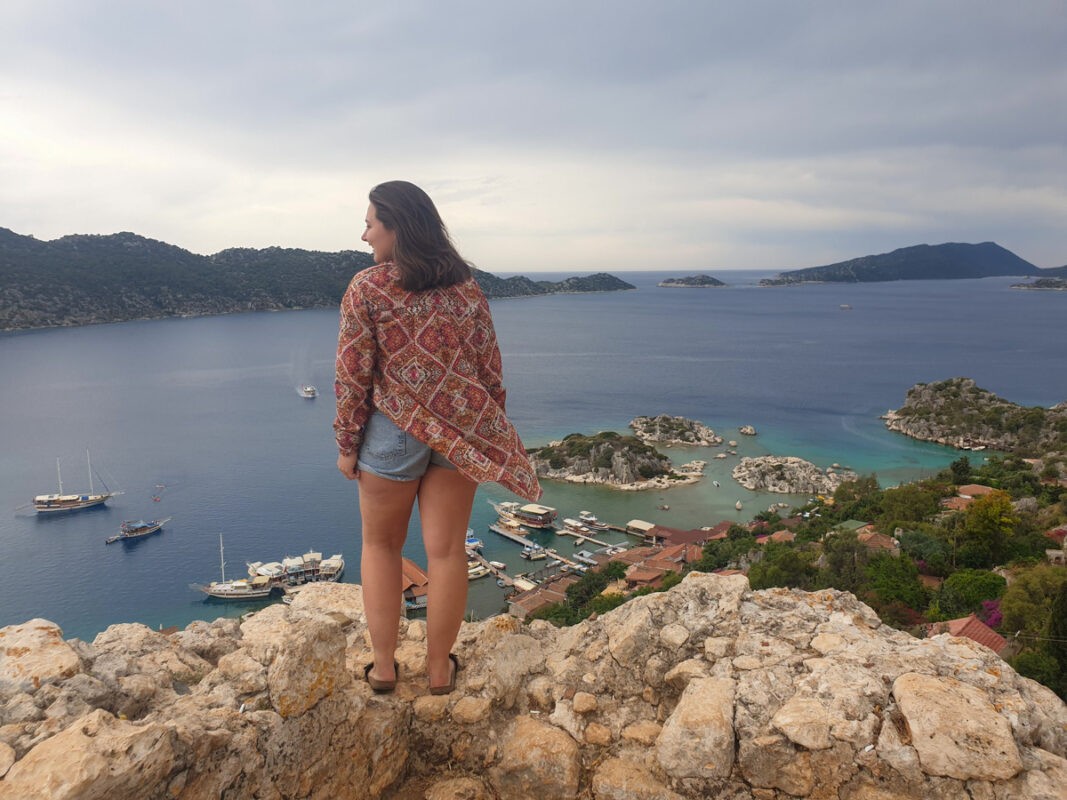Is Turkey safe? Generally, yes!
I’ve travelled the length and breadth of Turkey, and I have honestly never felt unsafe here.
I’ve also spent time as a solo female traveller in Turkey, and with usual precautions, never found it too challenging to travel.
Here are all my thoughts on safety in Turkey!
Is Turkey safe?
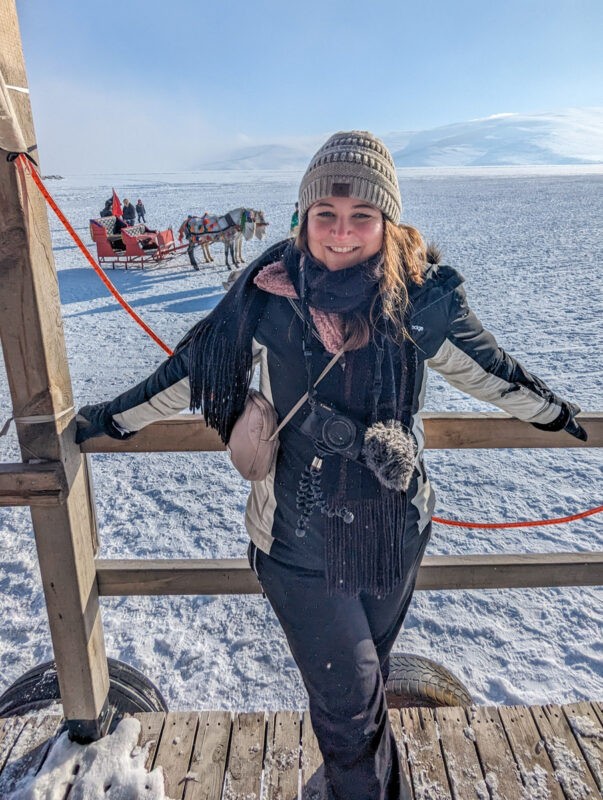
Yes, generally, Turkey is safe.
Crime levels are generally lower than Western European capitals (they’re higher in Istanbul and larger cities, but outside of these, in places like Cappadocia, rates are much lower).
There can be a few scams, but these usually aren’t as intense as in places like Egypt.
Terror attacks do happen, but they’re extremely uncommon – and they can happen anywhere in Europe or indeed in most places in the world.
I personally would have no reservations about visiting Turkey where safety is concerned. But let’s break it down a little more!
Crime rate in Turkey
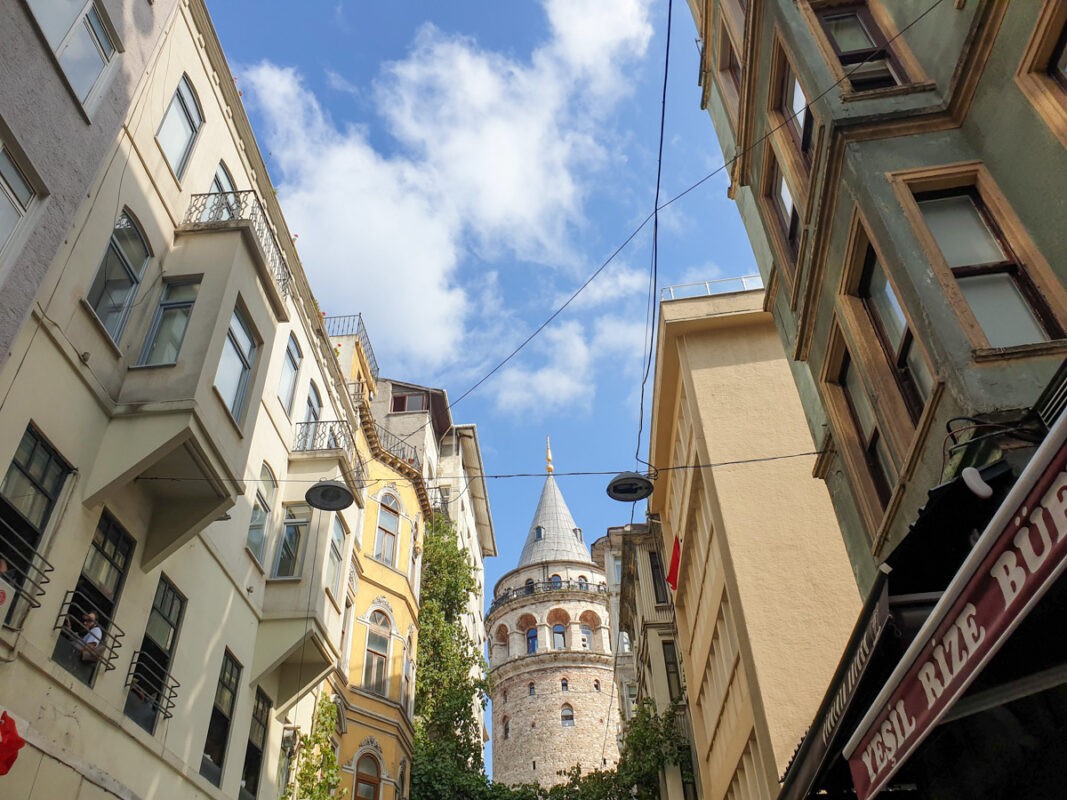
As mentioned, the crime rate in Turkey is smaller than that of many major Western European and US cities.
If you compare the crime rate between London and Istanbul, you’ll see that Istanbul’s isn’t necessarily a huge amount lower, but it does score lower in most factors.
I’ve never felt on edge in Istanbul (or any other Turkish city) due to crime – and it’s worth pointing out that I have felt like this in London, Paris and Rome.
So, while it’s important to keep your wits about you and take usual precautions – pickpocketing and petty theft does happen, and violent crime, while very uncommon, can occur – I wouldn’t say that crime is a huge concern in Turkey.
Scams in Turkey
Scams do happen in Turkey, although they aren’t as prevalent as in places like Egypt – and I’ve always found the rates to be comparable to other Mediterranean destinations like Greece.
Scams are usually low-level – they can include adding items to your bill in restaurants, watering down alcohol or taxis taking a long route to add fees to your journey!
Avoid these scams by being extra careful; if something is “free” it might be too good to be true, make sure you’re aware of the quickest route in a taxi and keep an eye on your drinks.
Road safety in Turkey
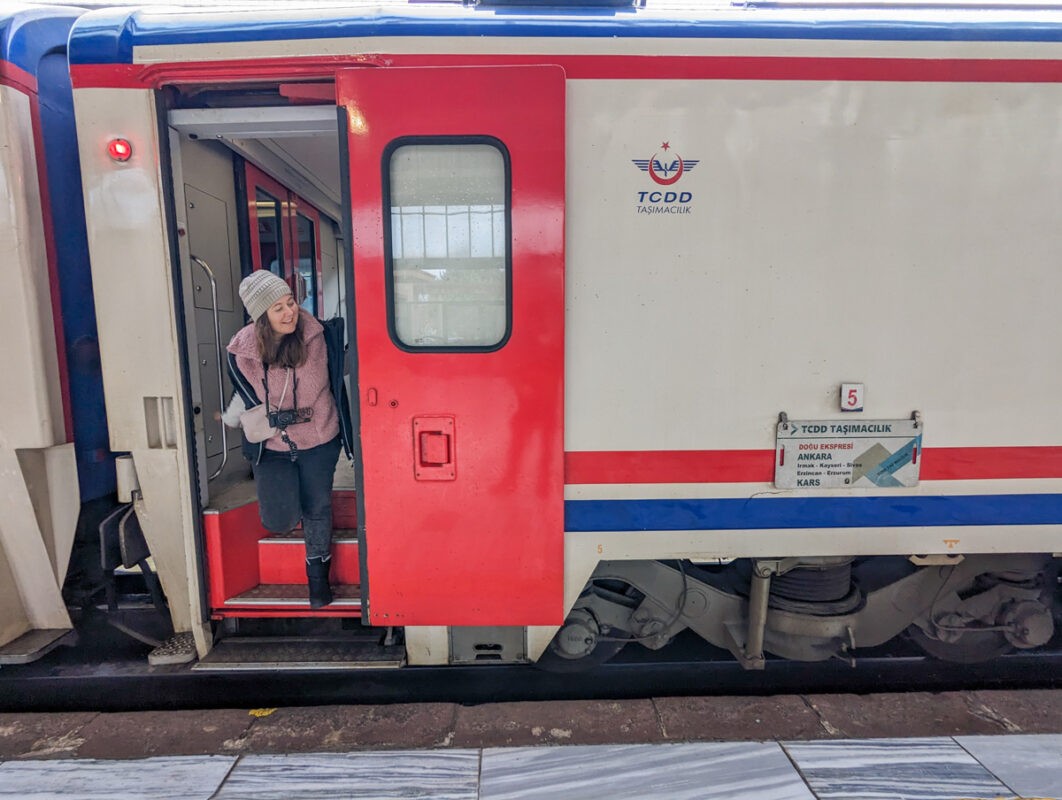
The road conditions in Turkey vary; personally, I wouldn’t drive here, but I haven’t driven in many countries!
Istanbul can be very hectic, but it’s largely similar to other cities of the same size. It does have excellent public transport infrastructure which makes the roads a little easier to navigate.
Outside of the cities, the roads are generally in decent condition, although sometimes driving can be a little chaotic. I wouldn’t recommend driving unless you’re experienced with driving in different countries – the rail and coach networks are very good in the country so you’ll easily be able to travel around without driving yourself.
Try out the Eastern Express train which travels from Ankara to Kars!
Is Turkey safe for solo female travellers?
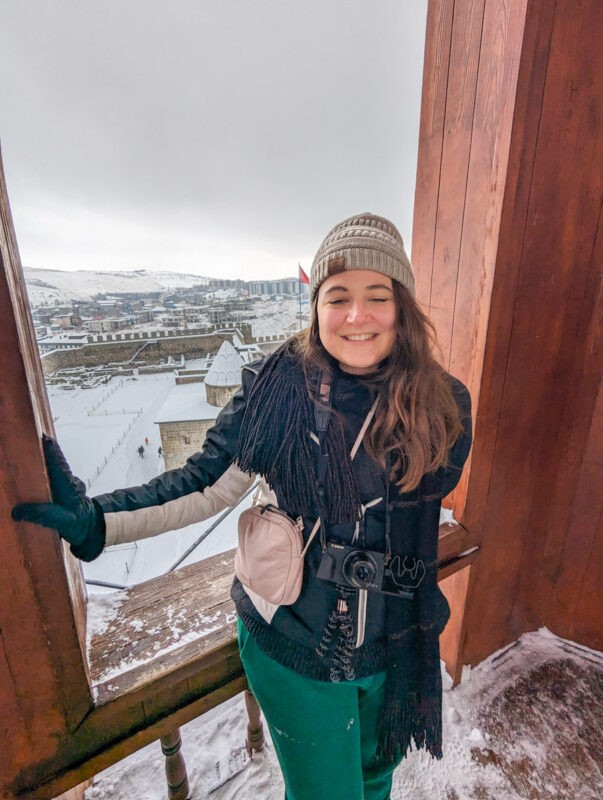
I’ve spent time in Turkey as a solo female traveller, including both in Istanbul and the east of the country, and have generally felt perfectly safe.
I’ve never experienced catcalling and I’ve never felt uncomfortable in that way. However, one of the notable things in Turkey is that many men have very patriarchal attitudes. Once, the owner of a hotel I was staying in called me a “hysterical woman” because I was asking him a few questions about the area!
On my recent Turkey winter trip – when I flew out alone but met my partner out there – the hotel receptionist literally pulled my small backpack off of my back so he could carry it up to my room for me. Of course, he had hospitable intentions, but the fact that he literally grabbed the backpack off of me made me feel quite uncomfortable!
Another interesting thing I’ve noticed when travelling in Turkey with my partner is that, even if I ask for a bill when dining at a restaurant and am holding my credit card to pay, the bill will still be given to my partner first. But of course, when I’m travelling as a solo female, I get the bill!
When travelling in Eastern Turkey on my own, I was asked a few times why I was alone, whether I had a husband and if said husband was going to meet me.
I’d just been travelling in Kazakhstan and Uzbekistan solo so was well-versed in these questions; they’re well-intended and are out of curiosity rather than anything malicious.
At the time, I was single, but depending on who asked the question sometimes I’d make up a fictional husband – other times I’d explain I was travelling alone.
But generally, I have found Turkish people to be friendly and welcoming to solo female travellers, even if attitudes are a bit dated at times.
Terrorism in Turkey
Unfortunatley terrorism does happen in Turkey, although these days attacks are a lot less frequent than they were a few years ago.
Turkey previously had a few ISIS-related terror attacks, although these have calmed down now. However, there is always a small risk of attacks related to ISIS or other Islamist groups – but this risk is the same in many other capitals in Europe.
There is also a militant group from Turkish Kurdistan. Kurdistan is an area of Turkey, Syria, Iran and Iraq which shares similar cultures, history and languages (and there are calls for a Kurdish state).
Kurdish people are generally exceptionally friendly and welcoming – I’ve met a few throughout my travels in Turkey – and while most would like a separate Kurdish state, nearly all campaign for this peacefully.
However, the PKK, or the Kurdistan Worker’s Party, is an extremist group that has gone to more violent extremes. There have been a couple of terror attacks by the PKK in recent years – one in Istanbul in 2022 and one in Ankara in 2023 (only the perpetrators died in the Anakra attack, although two people were injured. Six people died in the Istanbul attack).
The PKK isn’t concerned about tourists, but of course, there is always a minimal chance of getting caught in a crossfire. However, these incidents are still few and far between – and as I’ve mentioned a few times, attacks do occur in Western Europe as well. I still think that, when you compare all violent crime in Turkish cities to violent crime in Western European cities, Turkey is usually safer.
Is Turkey affected by the situation in Gaza?
Yes and no. Turkey is around 800 km from Israel at its closest point (Syria and Lebanon sit between the countries), so it’s a long way from the war itself and at present, there’s no risk of it getting physically involved in the war.
Turkey has expressed unwavering support to Palestine during the conflict – and has cut diplomatic ties with Israel as a result. There have also been increasing numbers of Palestinian refugees since the war broke out. Neither of these should affect most tourists, although Israeli tourists have been warned against visiting at this time.
In addition, there have been a few pro-Palestine protests in Turkey – as a tourist, it’s a good idea not to get directly involved in these (there can be legal ramifications for foreigners who protest) – but generally they are peaceful.
Even if many locals don’t agree with the UK or US government policies towards the war, they recognise that tourists aren’t their government – so you shouldn’t encounter any hostility, even if you are from a nation with opposing policies.
It’s also worth mentioning here that Turkey has frequently been home to refugees from across the Middle East, including Syria.
On a recent trip to Istanbul, I did an excellent Syrian food tour where I learned about Syrian culture in Turkey (and ate lots of tasty food!). It really helped me learn more about refugee crisis across the world and I highly recommend.
Food and water hygiene in Turkey
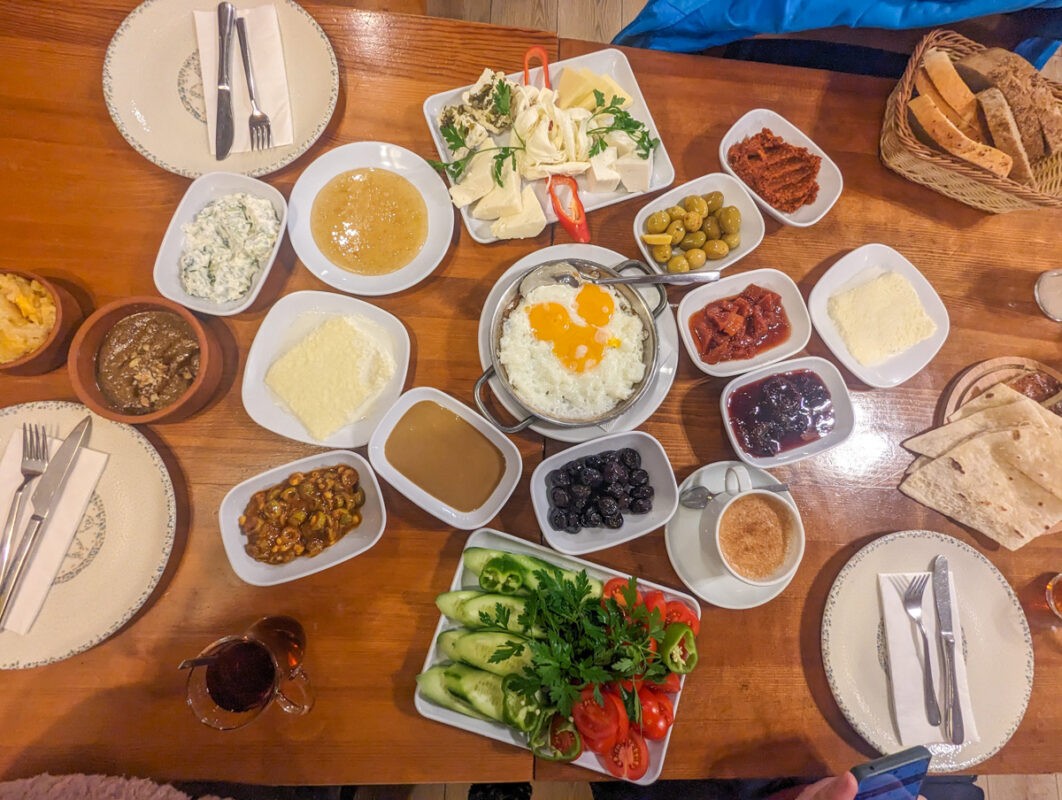
Turkish food is one of the most underrated cuisines in the world. Gozleme, pide, manti, Turkish breakfast… I could go on!
I’ve never had tummy trouble after eating Turkish food, including plenty of street food, and I’ve not heard of many others who’ve had issues.
I personally don’t drink tap water in Turkey straight from the tap – I use a Water to Go Bottle to purify it before then drinking.
However, it does seem to be treated, but with heavy chlorination which means that the taste can sometimes be bad. Plus, while most dangerous bacteria is usually removed, there is still some bacteria that non-locals might not be used to.
Alcohol in Turkey
While Turkey is a Muslim-majority country, it’s not secular, which means that it isn’t ruled by religion. In turn, this means that alcohol is readily available throughout the country.
Sometimes you might find that alcohol in tourist-focused areas is watered down or even is fake, “knock-off” alcohol – so keep an eye out for this!
As the culture is quite conservative, I’d highly recommend keeping within your limits when drinking in Turkey – don’t act rowdy or drunk on the streets, and keep aware of your surroundings.
Healthcare in Turkey
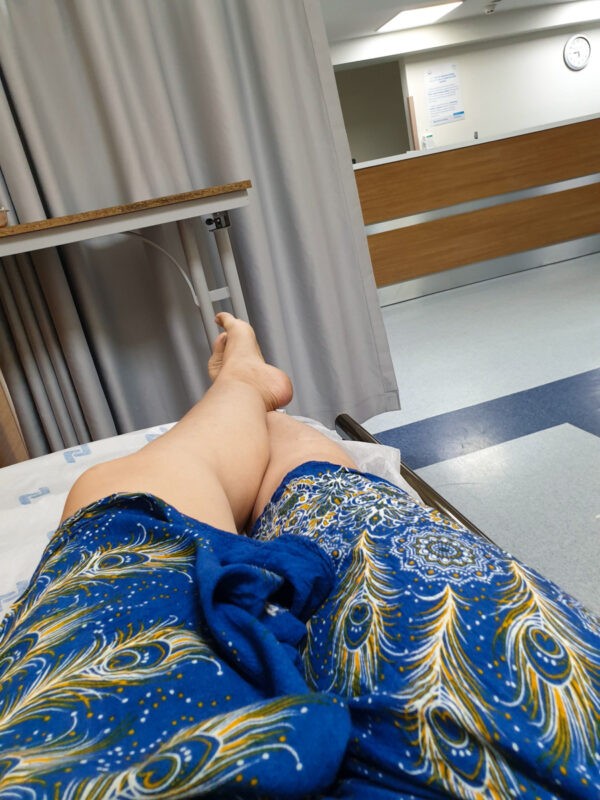
Healthcare in Turkey is world-class, and much cheaper than other nations around the world – there’s a reason why medical tourism is so popular!
I once had to go to hospital in Ankara, and my treatment was excellent. It was a clean hospital, the doctor spoke fluent English and I was seen in record time.
In fact, I’m thinking of going to Turkey to have a few check-sups and procedures that I can’t get on the British NHS in the future!
If you need medical treatment, I’d recommend fully researching hospitals before going to any – check the Google reviews and ensure that they’re tourist-friendly on their website.
It’s also a good idea to take out travel insurance – I always go with SafetyWing.
SafetyWing offers Nomad insurance for global destinations (including Turkey!) which includes emergency and some routine medical cover, along with baggage and cancellation covers. It’s perfect for digital nomads as you can purchase it while you’re already travelling and set it up on a monthly recurring basis. However, I use it when I go on trips from the UK (you can purchase it from as little as five days).
It’s effortless to set up and the team are incredibly helpful and friendly.
Is Turkey safe for Americans?
Turkey’s perfectly safe for Americans – just as much as it is for Europeans, those from the Middle East and everywhere else! Provided you take usual precautions and respect the local culture, you shouldn’t have any trouble in Turkey.
Advice for travelling to Turkey
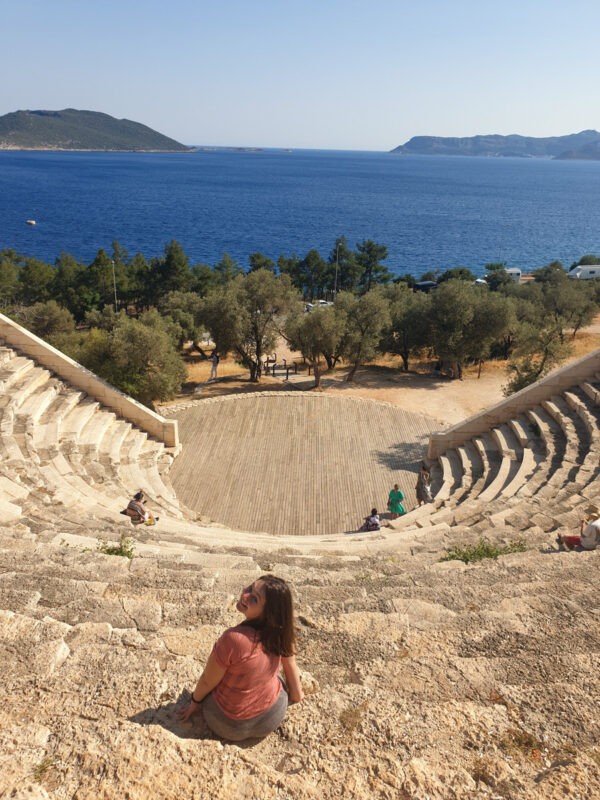
So, if you’re in need of some advice for travelling to Turkey, take a look at this list of safety tips!
- Stay vigilant in large cities, especially in crowded areas like markets and public transport.
- Double-check restaurant bills, monitor your drinks and know the quickest routes when taking taxis to avoid being overcharged.
- Use public transport options like buses, trains, and domestic flights instead of driving.
- Avoid poorly lit areas at night.
- Dress conservatively in rural or conservative areas.
- Keep up with local news and avoid areas that might be targets of terrorism.
- Choose hospitals with good reviews and ensure they cater to tourists.
- Always have travel insurance for medical emergencies.
